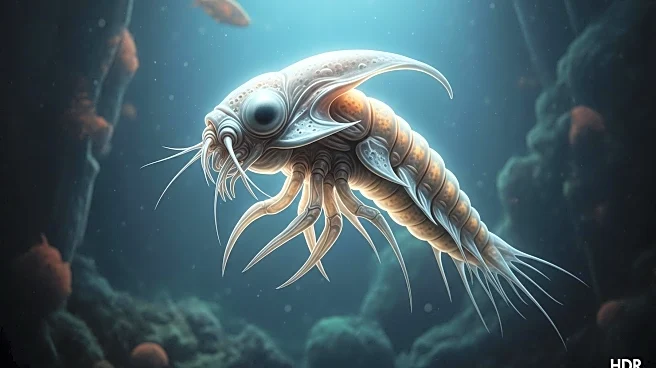What's Happening?
Researchers have identified a mysterious larva, known as facetotectans, as a probable parasite affecting marine life. These microscopic creatures have been known since the 1880s, but their adult form has remained elusive. Recent studies conducted by genomicist Niklas Dreyer and colleagues at the Natural History Museum of Denmark have constructed a genetic family tree, confirming their relation to barnacles. However, unlike other parasitic barnacles, facetotectans exhibit unique characteristics suggesting they live inside a host. The study indicates that these larvae, which live freely as babies, infest unknown host species as adults, potentially castrating their hosts and altering their behavior.
Why It's Important?
The identification of facetotectans as probable parasites has significant implications for marine ecosystems. These organisms can impact the reproductive capabilities of their hosts, such as crabs, by feminizing male crabs and causing them to behave like pregnant females. This discovery highlights the complexity of parasitic relationships in marine environments and underscores the importance of understanding these interactions for biodiversity and conservation efforts. The research also contributes to the broader scientific understanding of parasitism and evolutionary biology, offering insights into convergent evolution where similar traits arise independently across different species.
What's Next?
Further research is needed to identify the specific host species affected by facetotectans and to understand the full extent of their parasitic behavior. Scientists may explore the ecological impact of these parasites on marine populations and investigate potential methods to mitigate their effects. Additionally, the study opens avenues for exploring the evolutionary pathways of parasitism in marine organisms, which could lead to new discoveries in marine biology and ecology.
Beyond the Headlines
The study of facetotectans raises ethical considerations regarding the manipulation of marine life for scientific research. Understanding the balance between scientific inquiry and the preservation of natural ecosystems is crucial. Moreover, the research highlights the intricate relationships within marine environments, prompting discussions on the conservation of marine biodiversity and the protection of vulnerable species from parasitic threats.












